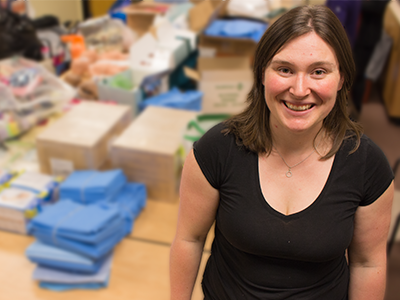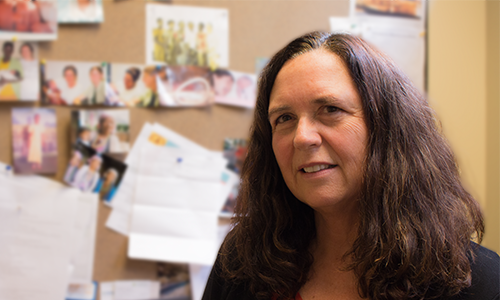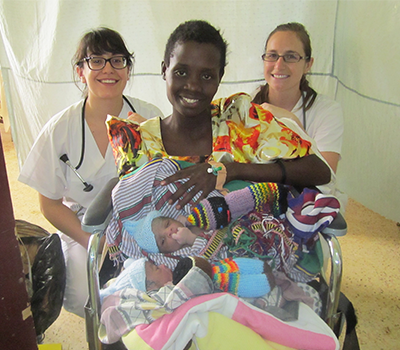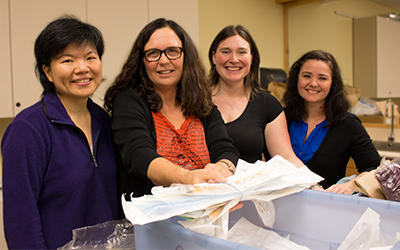It’s packing day at UBC’s Midwifery Office — and walking space is tight. Piles of hand-knit baby blankets and dolls line the perimeter of the main lecture room. Boxes of syringes and alcohol swabs are stacked chest-high on a nearby table. Meanwhile, students are unloading suturing kits, stethoscopes and scrubs off a dolly.

UBC Midwifery student Jacquelyn Thorne packs her bags for Nepal and Uganda.
“I’m hoping to pack a bag today, but we may just end up with another list,” says third-year UBC Midwifery student Jacquelyn Thorne.
Thorne is one of several students gearing up for this year’s Global Midwifery placements in Nepal and Uganda. And it’s her job — as lead packer — to squeeze all the medical supplies and equipment into a handful of suitcases. It’s a daunting task: one that’s bound to test her patience — and a few suitcase zippers — along the way.
“I’ve packed for a few mountain climbing trips before, but never for anything quite like this,” says Thorne, eyeing the blood pressure cuffs and sachets of lubricating jelly amassing beside her.
But, as Thorne will admit, no amount of supplies can fully prepare her and her fellow students for the experiences that lie ahead over the next several months.
In the regions of Nepal and Uganda where they’re headed, resources are scarce. In fact, in some rural areas, where electricity is unstable, the students and instructors will be relying on headlamps while attending deliveries — a precautionary move in the event the lights go out.
For Thorne, who has never travelled to a middle, let alone low-income country, the trip is bound to be an eye-opening experience.
“I am trying not to go in with too many expectations,” says Thorne. “But I am curious what you do with less. What do we do when we’re somewhere where we don’t have the necessary medication or even staffing required to do the things that we do here?”
Thorne knows that these questions have been asked before — by many former students who have participated in UBC’s Citizens for Global Midwifery Program.
Now in its tenth year running, the initiative offers Midwifery students the opportunity to participate in a six-week global practicum in a low-resource region of the world. In the past, students have travelled to Mexico, Zambia, Uganda as well as Nepal, where they’ve worked alongside local midwives and physicians to offer services to women in need.
This year, students have been given the opportunity to take part in two global placements. Some, like Thorne, have elected to participate in both and will work for three months abroad — spending an additional six weeks in Uganda after completing a practicum in Nepal, where they’ll work in Kathmandu and journey on a week-long trek to reach rural communities nestled in more mountainous terrain.
Gaining new skills and perspective
UBC Midwifery Instructor Cathy Ellis, who created the Citizens for Global Midwifery Program and has watched it develop over the last decade, says the placements are incredibly valuable for students, who learn how to handle child birth with very few resources.
“While UBC’s Midwifery students already conduct a rural placement as part of the four-year program, through these global placements, they are being further prepared to work in rural and remote areas of Canada, where they will have less technology, more responsibility and need to understand the social and economic determinants of health,” says Ellis.

UBC Midwifery Instructor Cathy Ellis has led the Citizens for Global Midwifery Program for the past decade.
Over the course of the six-week global placements, students come face-to-face with a myriad of complex deliveries and issues — like treating women with severe anemia or HIV.
In Uganda, where it’s been reported that more than 100 women die during childbirth each week, delivery wards are often overcrowded and basic medical equipment — like sutures and gloves — is scarce. Meanwhile, in more remote regions of Nepal, extreme distances and extreme poverty mean hospital transfers are simply out of the question when things go wrong.
“A couple of years ago, we worked in a very remote area of Nepal in a district hospital, where poverty, malnutrition and infant stunting were widespread — it was really an eye opener for both me and the students,” recalls Ellis.
Adopting an inter-professional approach to maternal care
As in the past, Ellis will help lead this year’s cohort with an inter-professional team of passionate health care providers, including family physician, Mickey Rostoker and Angela Spencer, a UBC Midwifery Clinical Assistant Professor.
For Spencer, who has travelled to Uganda with the program since 2009, the biggest reward is watching the students gain new perspective and confidence in their abilities as midwives.
“The midwifery students who have worked with me while abroad have expressed that they have gained a lot of confidence in the birthing process, which has made them a stronger care provider in Canada,” she says.
Last year, while working at Uganda’s Mbale Regional Referral Hospital, near the Kenyan border, Spencer supervised three students assist with over 150 deliveries in the span of just one month.
Global responsibility
But UBC’s Citizens for Global Midwifery Program is not just about exposing students to new learning experiences in low-resource areas of the world. In fact, for Ellis, who has spent over half her life’s work devoted to improving maternal health in countries like Mexico, Kosovo, Zambia, Uganda and Nepal, the initiative is a real opportunity to prepare graduates to become global citizens.

Former UBC Citizens for Global Midwifery Program participants Natalie Amran and Quinn Metcalfe celebrate with a new mother of twins in Uganda in 2012.
“I think helping students get that first guided experience of global maternal health is important so that they can see the importance of working in these different cultures and developing partnerships that raise the capacity of everybody,” says Ellis.
Third-year Midwifery student Rachelle Fulford, who, like Thorne, will be going on both placements, says the chance to meet and learn from others living in different parts of the world is what attracted her to the program in the first place.
“I hope to learn as much as I serve,” says Fulford. “I really feel that to understand what part I can play in global maternity care, as a Canadian and future midwife, I need to see first-hand what issues confront women around the globe and what issues maternity care workers face in providing care to those women. Only then can I really understand what my role could and should look like to support the growth of maternity care in places that need it most.”
Education is a major component of the program. Every year, the UBC team offers skills workshops to local midwives and students on a variety of topics, including neonatal resuscitation, post-partum haemorrhage, and breech delivery. This year, the students will be participating in teaching exchanges with midwives and students in Uganda, and working in conjunction with the Midwifery Society of Nepal to offer health education in rural Nepali villages.
In more recent years, the program has also facilitated three midwives to travel to the International Confederation of Midwives (ICM) Conference, where they’ve presented on work jointly conducted with UBC Midwifery faculty members. And, in 2008 the program helped bring Ugandan midwife Prossy Musoke to Canada to share her experiences with others and train in neonatal resuscitation.
Following footsteps

Cathy Ellis flanked by UBC Midwifery students Nancy Hsiao-Lan Tsao (far left), Jacquelyn Thorne and Rachelle Fulford (far right).
In the years ahead, Ellis is hopeful that when the time comes for her to step away from teaching, others will be interested in stepping in to run the program.
“I want to feel that I have inspired others to follow in my footsteps,” says Ellis.
Until that time comes, a number of alumni have expressed an interest in taking part in future trips as junior instructors. Other past students have already gone back to work abroad, serving with humanitarian organizations like Médecins Sans Frontières.
For Thorne, the prospect of one day returning to Uganda, Nepal, or another region of the world to offer midwifery services and build global partnerships is very attractive — in fact, you can bet she’s probably working on the packing list already.
This year, as in the past, UBC’s Midwifery students will be blogging about their experience while abroad. Follow their journey in Nepal (April 10-May 24) and Uganda (May 25-July 7) at http://blogs.ubc.ca/globalcitizenshipnepalanduganda/ And don’t miss this short interview with UBC student Jacquelyn Thorne on what attracted her to a career in midwifery.
UBC’s Citizens for Global Midwifery initiative would not be possible without the generous donations of supplies from the community, as well as monetary donations. To donate, visit the Midwifery Students for Global Citizenship Fund page.